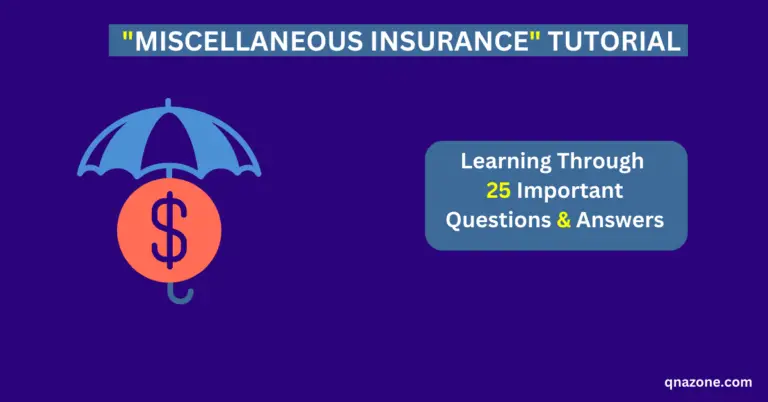30 Important Introduction to Insurance Questions and Answers [Notes with PDF]
The first chapter of our Insurance learning course is “Introduction to Insurance.” In this post, we’ll learn about the details of the introduction to insurance, which includes the 30 most important questions and their answers.
It will help you quickly grasp important “introduction to insurance” terms and their definitions.
You can quickly prepare for any competitive test, such as school and college exams, vivas, job interviews, and so on, by reading this post.
So let’s get started.
Introduction to Insurance Questions and Answers:
The 30 important “Introduction to Insurance Questions and Answers” are as follows:
Question 01: What is an Insurance?
Answer: Insurance is a way of providing financial relief or security to people who are at risk. The current insurance system is working to address the risk of loss of life and property.
Every aspect of a person’s life, including his wealth, is fraught with risk. Insurance is a type of written agreement in which the insurer or organization bears the risk or danger in exchange for a fixed premium.
On the other hand, the insured guarantees monetary compensation or payment in the event of death or property loss due to any reason specified in the contract.
Question 02: What are the Features of Insurance?
Answer: The top 5 features of insurance are as follows:
- Insurance is a type of financial protection against risk.
- It distributes risks among individuals at risk.
- Its content is a threat to human life and property.
- In return for the premium, the insurance company takes the risk of life and property.
- And the insurance company is obliged to pay in case of loss due to the insured.
Question 03: What is the Importance of Insurance?
Answer: The importance of insurance is as follows:
Importance of insurance in personal life:
- Brings financial security
- Creation of savings
- Provides the facilities for investment
- Security of old age
- Brings mental satisfaction
Importance of insurance to the spread of business:
- Reduces the hindrance of risk
- Encourages investment
- Development of foreign trade
- Stimulates the employees
Economic importance:
- Increases Savings
- Formation of capital and increase of investment
- Creation of employment opportunity
- Increases Govt. revenue
- Increases invisible export
Social importance:
- Establishment of social security
- Increases awareness of the citizens
- The solution to unemployment problems
Question 04: Why is an Insurance called the Risk-Sharing System?
Answer: Insurance is a collective measure of risk-sharing among people who are exposed to similar risks. The safety and security of human life and property are always in jeopardy.
As a result, people have been considering ways to reduce this risk since the beginning. They have attempted to reduce it through collaborative measures.
At one point, the insurance industry expanded. In this case, the person at risk pays the premium, and those who are harmed are compensated.
Because of this, Insurance is referred to as a risk-sharing system.
Question 05: How much Insurance is Important in Business?
Answer: Insurance is a type of financial protection against the risks that humans and their property face.
In business, trade barriers are a significant impediment. Shipwrecks, factory fires, and other accidents that occur while transporting goods or operating machinery are all too common.
As a result, theft, robbery, and goods price reductions, among other things, always cause concern among traders.
In this case, insurance provides financial protection to traders, allowing them to run their businesses.
That is why in business, insurance is so important.
Question 06: What is Risk?
Answer: In general, risk refers to the possibility of financial harm.
Risk is the uncertainty about whether or not a financial loss will occur.
Risk is the financial element of the potential loss, fear, or uncertainty surrounding human life and property.
Question 07: What are the Features of Risk?
Answer: The top 4 features of risk are as follows:
- Risks are associated with apprehension or uncertainty. The risk increases as the level of uncertainty increases.
- In the case of insurance, the uncertainty of financial loss is considered a risk.
- Using probability theory and other methods, it is possible to calculate the monetary amount of risk.
- While the risk cannot be completely eliminated, financial protection can be provided by spreading it among many people who are at risk.
Question 08: What are the Various Types of Risk?
Answer:
The various types of risk are as follows:
Based on considering measurability:
- Financial risk
- Non-financial risk
Based on considering outcome:
- Pure risk
- Speculative risk
Based on considering cause and consequence:
- Fundamental risk
- Particular risk
Based on assessing insurability:
- Insurable risk
- Super-standard risk
- Standard risk
- Sub-standard risk
2. Uninsurable risk
Question 09: What is Financial Risk?
Financial risk is the risk of financial loss to an individual or organization due to a dangerous situation, activity, or accident.
Financial risk is quantifiable in terms of money. Shipwrecks, factory fires, and goods theft, among other things, are all quantifiable risks. These are examples of financial risks.
The risk of a person’s accident can also be determined by a court decision or a mutual agreement between the insured and the insured’s lawyers. As a result, there is a financial risk involved.
In most cases, financial risks are insurable.
Question 10: What is Non-Financial Risk?
Answer: Non-financial risk is the result of a risk that cannot be quantified financially.
For example, the expected taste of the new items in the fast-food store can be disappointing, and the risk is not economically measurable.
Choosing a profession as a career, as well as making marriage decisions, involve risks. However, it is impossible to quantify this type of risk in terms of money.
This is regarded as a non-financial risk. These kinds of risks are uninsurable.
Question 11: What is Fundamental Risk?
Answer: Fundamental risk arises from an uncontrollable cause of an individual or organization and has consequences that affect everyone.
Natural and artificial factors can both contribute to fundamental risks. Natural disasters like earthquakes, floods, volcanic eruptions, famines, epidemics, and other natural disasters, as well as unnatural causes like political instability, war, and recession, are examples of fundamental risks.
In most cases, such losses are uninsurable. On the other hand, Cyclones are covered by marine insurance.
Question 12: What is a Pure Risk?
Answer: Any person or organization that is certain to be harmed in a potentially hazardous situation or an accident is considered a pure risk.
The damage is done when goods are burned, stolen, people die, or people are paralyzed in an accident. All of these risks are pure risks.
If it burns down or the machine breaks down, the financial loss incurred by the organization is also at pure risk.
Question 13: What is Speculative Risk?
Answer: A speculative risk is an event or uncertainty that results in profit or loss beyond the individual’s or organization’s expected outcomes.
When it comes to stock investing, both profit and loss are possible outcomes. It is a speculative risk.
Question 14: What is a Specific Risk?
Answer: A specific risk affects a single person, individual, or organization for personal, institutional, or other reasons.
Examples of specific risks include fires, thefts, robberies, personal accidents, vehicle accidents, etc. These types of risks are always insurable.
Question 15: What is an Insurable Risk?
Answer: An insurable risk is a risk against which financial protection is sought through insurance. Insurable risks include those involving human life and property.
All remaining risks are considered insurable, except natural disasters, calamities, famines, epidemics, economic recessions, wars, social, political, and technological changes, and so on.
Question 16: What is an Non-insurable Risk?
Answer: Non-insurable risk refers to a risk for which no insurance benefit is available.
Risks resulting in general and having no human authority or control over them are generally considered irreversible risks.
Earthquakes, floods, famines, epidemics, wars, economic downturns, social, economic, political, etc., are among the most non-insurable risks.
Question 17: What are the 10 Principles of the Insurance Business?
Answer: The ten (10) principles of the insurance business are as follows:
- Principle of insurable interest
- Principle of fiduciary relationship
- Principle of financial indemnity
- Principle of causa Proxima
- Principle of proportionate contribution
- Principle of Subrogation
- Principle of collecting a large number of policy
- Principle of Probability
- Principle of taking an optimum risk
- Principle of quick response
Question 18: What is an Insurance Contract?
Answer: An insurance contract in which one party agrees to compensate the other for a loss may occur or pay a specific amount of money if a particular event happens in exchange for a premium.
Insurance is a financial transaction in which a sum of money is paid as a premium in exchange for the insurer’s risk of paying a large sum in the event of a specified occurrence.
Question 19: What are the Features of the Insurance Contract?
Answer: The top 9 features of the Insurance contract are as follows:
- Insurance is a legal contract, not a bet.
- An insurance contract must be written, unlike a general contract, which can be spoken, written, and registered.
- Insurance is a type of financial protection against potential losses.
- In insurance, the premium paid by the insured compensates the insurer for the risk taken.
- In such a contract, the insured must have a financial interest in the insured content.
- A trusting relationship makes between the insurer and the insured as a result of this agreement.
- Insurance contracts place a strong emphasis on specificity.
- The more insurance contracts or insurance policies that can be opened, the more risk-sharing opportunities there are.
- Although all contracts involve mutual interests, insurance contracts show that human welfare takes precedence.
Question 20: What are the Top 6 Natures of Insurance Contact?
Answer: The top 6 natures of insurance contact are as follows:
- The cooperative device of risk distribution
- Financial protection device
- Premium against risk
- Assurance or compensation
- Compensation for contractual events or accidents
- Insurance is not gambling
Question 21: What are the Essential Elements of the Insurance Contract?
Answer: The essential elements of the insurance contract are as follows:
Legal aspects in respect of the contract:
- Two Parties
- Lawful consideration and object
- Capacity to contract the parties
- Certainty
- Written
Elements related to the insurance business:
- Insurable Interest
- Fiduciary relationship
- Payment of premium
- Financial indemnity or payment
- Causa Proxima
- Proportionate Contribution
- Subrogation
Question 22: What is Insurable Interest?
Answer: It cannot be insured without insurable interest. Insurable interest means financial interest. The purpose of the insurance contract is to protect such interests.
Such interest must be maintained in every insurance contract.
The house of “A” cannot be insured by “B”, but if the home of “A” is mortgaged to “B”, then the financial interest of “B” arises in that house, and then he can insure it.
An insurable interest in which the insured benefits financially from its safety and suffers financially from its loss or damage can be defined as a financial or pecuniary interest in the subject matter of insurance.
Question 23: Why is Insurable Interest Important in Insurance Business?
Answer: Insurable interest refers to the insured financial interest in the insured content.
Under the law, insurance is a legal business. It would be gambling to collect money from an insurance company by insuring the life or property of a sick or dying person.
However, it is necessary for the insured to have a financial interest in the insured in the case of insurance. Insurance was created to safeguard those economic interests. As a result, insurable interests are essential in the insurance business.
Question 24: Why is The Insurance Contract Called The “Contract of Ultimate Faith”?
Answer: Under the principle of ultimate faith, the contracting parties must provide the necessary information.
Because of the nature of the insurance contract, the law establishes a trust relationship between the two parties; both parties are required to provide each other with all relevant information.
The insurance contract may be canceled if neither party provides all the required information.
Suppose a person with heart disease conceals to provide this information while insuring. In that case, the insurance company may cancel the contract later on the grounds of concealing the necessary information.
This is why an insurance contract is referred to as an “ultimate faith” contract.
Question 25: Why is an Insurance Contract Called a Compensation Contract?
Answer: Property insurance is the only type of compensation contract.
The contract for compensation for the amount of damage is known as the contract for compensation.
The loss in an insurance contract can be total or partial, but it must be able to be measured. In property, the insurance company compensates the loss in any type of insurance, such as marine insurance, fire insurance, and accident insurance.
However, life insurance is exempt from the compensation policy. If a person died or was crippled in an accident, it is impossible to estimate how much money was lost. So that’s the contract with the guarantee.
Question 26: What is the Principle of Subrogation?
Answer: In the case of property insurance, the insurer pays the insured the total amount of the loss. However, the wreckage of the property or the related claim may still be valid in that case.
The principle of Subrogation refers to the policy that transfers ownership of the wreckage or related claim to the insurer instead of the insured.
If a ship sinks in the sea, the insurance company becomes the owner of the ship once the insurance claim is paid in full. This is known as the principle of Subrogation.
Question 27: What is the Principle of Proportionate Contribution?
Answer: The essence of the Proportional contribution principle is that if a property is insured with more than one insurance company and all the insurance companies are obliged to compensate for its partial loss in proportion to their sum insured.
For example, “A” insures his property with two companies in equal amounts for a total of $5 00,000. Suppose the property suffers a loss of $2 00,000 and “A” collects compensation from one company. In that case, he will get a proportional share from another company, i.e. $1, 00,000. Such a policy only applies to property insurance.
Question 28: What is the Principle of Probability?
Answer: In the insurance industry, the probability principle is applied. The insurance company assesses the likelihood of liability for a risk based on his extensive experience and observations.
Based on this, the premium rate is determined, and whether or not risk will be taken is decided.
The assistance of actuaries is sought in the assessment of liability, which is done in accordance with the probability policy.
Question 29: What is the Classification of Insurance?
Answer: The classification of insurance is as follows:
- Personal insurance:
- Life insurance
- Personal accident insurance
- Other personal insurance
- Sickness insurance
- Hospitalization and medical expenses insurance
- Unemployment insurance
- Maternity insurance
2. Property insurance:
- Marine insurance
- Fire insurance
- Other property insurance
- Accident insurance
- Automobile or motor insurance
- Crop insurance
- Machinery insurance
- Aviation insurance
- Cyclone insurance
- Cattle Insurance
- Theft insurance
3. Liability Insurance:
- Employer’s liability insurance
- Employees insurance
- Third-party insurance
- Public liability insurance
- Professional indemnity insurance
- Product liability insurance
4. Fidelity Insurance:
- Fiduciary insurance
- Credit insurance
- Privilege insurance
Question 30: What is the Proximate Cause of Loss?
Answer: The proximate cause of loss is the closest to the loss or payment in the insurance contract, which means that the insured will only be compensated if the loss is caused by a cause directly related to the reason for the loss or payment in the insurance contract.
The insurance company would not compensate you if a remote cause caused the damage.
A ship is insured for losses due to collisions. The ship capsized, and the oranges inside the ship rotted away as it was too late to disembark. Later, the court ruled that the loss was not due to direct or indirect causes, so the insured will not get compensation.
I hope that by the end of this post, you have a good understanding of the “Introduction to insurance” chapter. If you have any doubts or questions, don’t hesitate to contact us or leave a comment so that we can respond soon.
You can also read:




